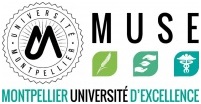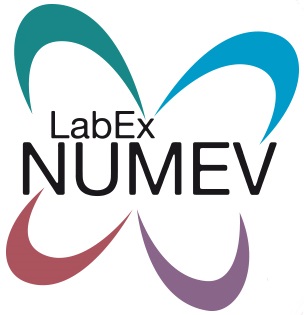National partnerships
AMAP lab is one of the 43 laboratories of the Agronomy-Environment-Biodiversity cluster of Montpellier University of Excellence (I-Site MUSE). As such, it is affiliated to the Cemeb and Agro Laboratories of Excellence (LabEx) and to Gaia Doctoral School (no. 584). AMAP is also affiliated to #DigitAg Institute of Convergence and secondarily to Numev LabEx and I2S Doctoral School (n° 166). At the national level, AMAP participates to CEBA LabEx for its activities in French Guiana and to the national infrastructure for sharing digital naturalist collections through Recolnat.

 Montpellier University of Excellence (I-site MUSE) is project involving 19 reserach organisations towards a common ambition: to create in Montpellier a thematic university of advance research, internationally recognised for its impact in the fields related to agriculture, environment and health, likely to become for all the members of the consortium a privileged academic partner. As one of the research labs within the scope of I-SITE, AMAP is eligible to MUSE calls for proposals and is committed to respect its charter for the signature of publications.
Montpellier University of Excellence (I-site MUSE) is project involving 19 reserach organisations towards a common ambition: to create in Montpellier a thematic university of advance research, internationally recognised for its impact in the fields related to agriculture, environment and health, likely to become for all the members of the consortium a privileged academic partner. As one of the research labs within the scope of I-SITE, AMAP is eligible to MUSE calls for proposals and is committed to respect its charter for the signature of publications.
 Agro is a Laboratory of Excellence (LabEx) that brings together 44 research labs located in Montpellier and the surrounding area. It brings together 1,300 scientists and 600 PhD students in agronomy, food, biodiversity and the environment, with a specific focus on tropical and Mediterranean regions. It is supported by Agropolis Fondation, the Foundation for Scientific Cooperation (FCS) for agriculture and sustainable development created in 2007 by INRA, CIRAD, Montpellier SupAgro, IRD and the University of Montpellier. The foundation is located in Montpellier, in the heart of the Agropolis International cluster. As a unit attached to LabEx Agro, AMAP is invited to participate in the Executive Group of Directors (GDU) whose role is consultative.
Agro is a Laboratory of Excellence (LabEx) that brings together 44 research labs located in Montpellier and the surrounding area. It brings together 1,300 scientists and 600 PhD students in agronomy, food, biodiversity and the environment, with a specific focus on tropical and Mediterranean regions. It is supported by Agropolis Fondation, the Foundation for Scientific Cooperation (FCS) for agriculture and sustainable development created in 2007 by INRA, CIRAD, Montpellier SupAgro, IRD and the University of Montpellier. The foundation is located in Montpellier, in the heart of the Agropolis International cluster. As a unit attached to LabEx Agro, AMAP is invited to participate in the Executive Group of Directors (GDU) whose role is consultative.
 RECOLNAT is a Group of Scientific Interest (GIS) set up in 2020 to ensure the sustainability of the e-ReColNat Infrastructure project. Supported since 2011 as part of a national plan for investment (PIA), e-ReColNat has enabled the creation of a "virtual museum" for the consultation of tens of millions of plant and animal specimens from Natural History collections. Together with the Natural History Museum in Paris (which leads the project), AMAP was at the initiation of eRECOLNAT, then piloting the digitisation of several French overseas herbariums (inCayenne, Nouméa, La Réunion Island and Mayotte) and that of the University of Rabat (Morocco), as well as by carrying out part of the computer developments. RECOLNAT constitutes a network of scientific excellence that will make it possible to harmonise the practices relating to naturalist collections, and to offer wider access to these collections and their data. RECOLNAT is also the French nodal point of the EuropeanDiSSCo infrastructure.
RECOLNAT is a Group of Scientific Interest (GIS) set up in 2020 to ensure the sustainability of the e-ReColNat Infrastructure project. Supported since 2011 as part of a national plan for investment (PIA), e-ReColNat has enabled the creation of a "virtual museum" for the consultation of tens of millions of plant and animal specimens from Natural History collections. Together with the Natural History Museum in Paris (which leads the project), AMAP was at the initiation of eRECOLNAT, then piloting the digitisation of several French overseas herbariums (inCayenne, Nouméa, La Réunion Island and Mayotte) and that of the University of Rabat (Morocco), as well as by carrying out part of the computer developments. RECOLNAT constitutes a network of scientific excellence that will make it possible to harmonise the practices relating to naturalist collections, and to offer wider access to these collections and their data. RECOLNAT is also the French nodal point of the EuropeanDiSSCo infrastructure.
 CeMEB (Mediterranean Centre for the Environment and Biodiversity) is a Laboratory of Excellence (LabEx) that brings together a group of ten research labs from Montpellier and Perpignan working on the dynamics and functioning of biodiversity and ecosystems in a context of marked environmental changes, induced in particular by human activities. An important objective is to predict the biological consequences of global changes using scenarios and to anticipate the evolution of ecosystem services and human societies. CeMEB supports actions to structure research (shared platforms, doctoral and Amazonian ecosystems, and the implications of this diversity on ecosystem processes and on Guyanese populations. CEBA supports annual projects, structuring projects, PhDs and provides basic support for research activities in French Guiana. The Management Committee includes one representative from each member lab.
CeMEB (Mediterranean Centre for the Environment and Biodiversity) is a Laboratory of Excellence (LabEx) that brings together a group of ten research labs from Montpellier and Perpignan working on the dynamics and functioning of biodiversity and ecosystems in a context of marked environmental changes, induced in particular by human activities. An important objective is to predict the biological consequences of global changes using scenarios and to anticipate the evolution of ecosystem services and human societies. CeMEB supports actions to structure research (shared platforms, doctoral and Amazonian ecosystems, and the implications of this diversity on ecosystem processes and on Guyanese populations. CEBA supports annual projects, structuring projects, PhDs and provides basic support for research activities in French Guiana. The Management Committee includes one representative from each member lab.
 CEBA(Centre for the Study of Amazonian Biodiversity) laboratory of Excellence (LabEx) is a network of 13 research labss, 4 of which are based in French Guiana, the others being in Montpellier, Toulouse, Bordeaux, Fort-de-France, Gif-sur-Yvette and Nancy. More than 110 permanent researchers with expertise in ecology, evolutionary biology, genomics, infectious diseases, epidemiology, environmental sciences, paleoecology, chemistry, law and political science, seek to understand the extraordinary biological diversity of
CEBA(Centre for the Study of Amazonian Biodiversity) laboratory of Excellence (LabEx) is a network of 13 research labss, 4 of which are based in French Guiana, the others being in Montpellier, Toulouse, Bordeaux, Fort-de-France, Gif-sur-Yvette and Nancy. More than 110 permanent researchers with expertise in ecology, evolutionary biology, genomics, infectious diseases, epidemiology, environmental sciences, paleoecology, chemistry, law and political science, seek to understand the extraordinary biological diversity of
 AMAP benefits from a secondary affiliation to NuMev Laboratory of Excellence (LabEx). NuMEV (Digital and Material Solutions for the Environment and Life), created in 2011, aims to support research on digital, physical and engineering sciences at the interface with environmental and life sciences in Montpellier. It supports research projects, PhD and post-doc grants, equipments and training activities.
AMAP benefits from a secondary affiliation to NuMev Laboratory of Excellence (LabEx). NuMEV (Digital and Material Solutions for the Environment and Life), created in 2011, aims to support research on digital, physical and engineering sciences at the interface with environmental and life sciences in Montpellier. It supports research projects, PhD and post-doc grants, equipments and training activities.
 #DigitAg Convergence Institute, created in 2017, involves 17 founding members. It supports interdisciplinary programmes to create knowledge on the use of digital technology in agriculture. This support mainly takes the form of scholarships for PhD or master's degrees, and incoming or outgoing mobility.
#DigitAg Convergence Institute, created in 2017, involves 17 founding members. It supports interdisciplinary programmes to create knowledge on the use of digital technology in agriculture. This support mainly takes the form of scholarships for PhD or master's degrees, and incoming or outgoing mobility.